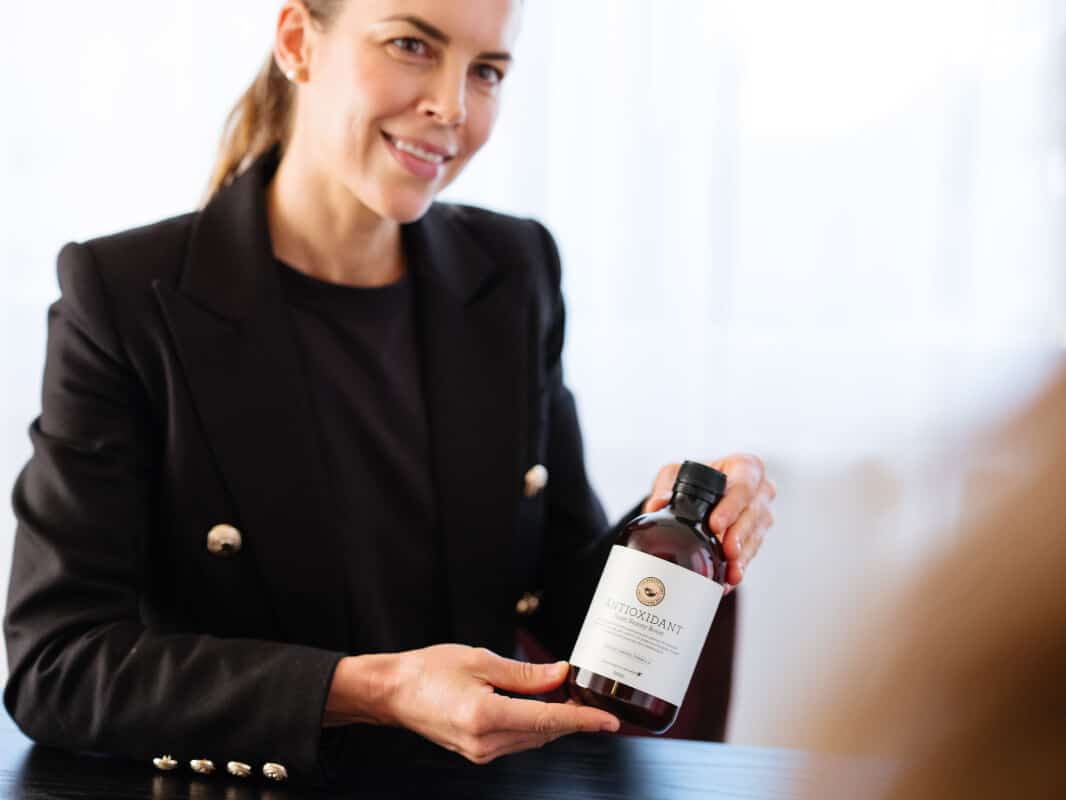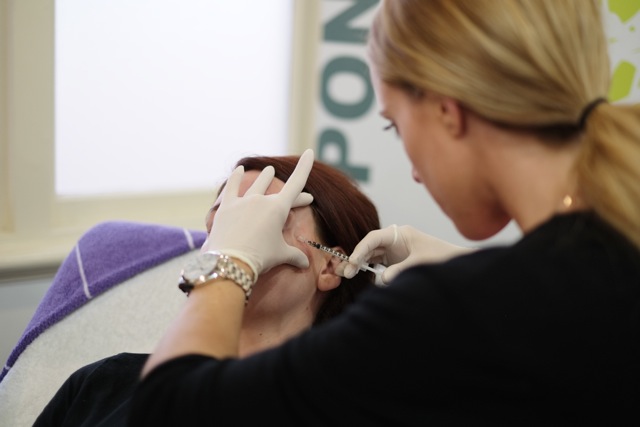How Gut Health Impacts our Skin

As one of our largest organs, our skin functions as a window to our internal health.
Gut related issues can mean our body is unable to effectively absorb the nutrients from the foods we eat, can trigger inflammation within our body, and also impact our hormonal balance and immune system.
This means our skin doesn’t receive the vital nutrients it requires for regeneration and healing and is subject to an increase in inflammatory skin conditions such as Acne, Rosacea, Eczema, Dermatitis and premature ageing. The presence of any skin symptoms can be useful in pointing us towards underlying gut issues and imbalances. The health of our gut is mirrored in the skin.
What is Gut Health?
A healthy gut is essential for clear, glowing skin. Our gut is where we digest and absorb the nutrients from the foods we eat, absorb hydration and eliminate waste. It is also home to our ‘microbiome’ – the good bacteria that maintains the health of our gut, crowd out harmful bacteria and help maintain hormonal balance.
Approximately 80% of our immune cells and an estimated 90% of our body’s ‘happy hormone’ serotonin reside here. Imbalances in these systems cause systemic inflammation, directly impacting our skin by causing an increase in inflammatory skin issues.
What causes Gut Issues?
There are a number of cumulative factors that can lead to poor gut health. These include:
- Regularly eating foods that irritate and breakdown our gut lining – foods containing Gluten, Casein A1 dairy, or foods sprayed with the chemical Glyphosate (much of our conventional produce is sprayed with this chemical).
- Inflammatory foods – processed sugar and processed foods.
- Poor nutrition – not enough nutrients needed to feed our Microbiome, including Fibre, Zinc, Magnesium, Essential Fatty Acids.
- Chronic stress – this affects our gut microbiome and gut lining and can be emotional as well as physical, such as over exercising when your body needs rest.
- Poor sleep quality, or not enough sleep – this increases inflammation, and causes increased redness and dehydration in our skin.
- Medications such as antibiotics and laxatives – these alter the balance of our microbiome.
- Low vitamin D – this is essential for maintaining tight junctions in our gut lining, also important for keratinocyte (skin cell) production.

What impact does this have on my skin?
Inflammation driven by the gut can lead to:
- Breakouts
- Acne
- Rosacea
- Eczema
- Dermatitis
- Premature Ageing
- Decreased ability to recover from skin damage
How can I support my skin and gut health?
The following ’tools’ will guide you on the path to clear, glowing skin. This will assist you in being able to understand what you need to support your gut health, and the nourishing skin care to combine this with which will help reduce inflammation and support healing.
Internal Support
Gut Lining support
Gut Primer by The Beauty Chef – For 1-3 months. This acts like an ‘internal skin primer’ with nutrients and herbs to repair, heal and soothe your gut lining and support liver function. These include organic licorice root, slippery elm, anti inflammatory turmeric, milk thistle, calming aloe vera, zinc, the amino acid L Glutamine, papaya and peppermint to soothe and calm. If you are still experiencing gut issues after 3 months of using this please see your health care practitioner.
Microbiome support
Glow by The Beauty Chef – This is a blend taken daily to support the health of your ‘good bacteria’. Glow includes organic prebiotics, probiotics, queen garnet plum and maqui berry (vitamin c and antioxidant support for skin), anti inflammatory turmeric, chia seeds for omega 3 support and zinc for healing. It also contains dunaliella salina, a micro algae grown in WA that is rich in pro vitamin A, vitamins, minerals, essential fatty acids, and saccharomyces boulardii bacteria (SB).
Diet
- Low fructose – fructose causes an increase in inflammation, check labels for high-fructose corn syrup, honey, agave syrup, maple flavoured syrup, molasses, palm or coconut sugar, sorghum.
- Avoid casein A1 dairy – for 1-3 months as this can cause and increase in inflammation.
- Avoid gluten – for 1-3 months while your gut heals, as this can cause inflammation.
- Avoid glyphosate – the active in ‘round up’ that is sprayed on much of our conventional produce. This is breaks down our gut lining and kills the microbes in the soil and the foods we eat, so negatively impacts our gut bacteria. Aim for organic produce where possible.
- Increase fibre – this feeds the good bacteria in the colon and helps support elimination of waste. Do this gradually and make sure to increase hydration also, as fibre absorbs water and can cause constipation if you’re not drinking enough.
- Increase fermentable foods like kimchi and sauerkraut to feed your ‘good’ bacteria.
- Eat a diverse, local, seasonal diet as much as possible – for gut microbiome diversity we need diversity in the foods we eat.
Supplement and herbal support
- Omega 3 EFAs – anti inflammatory for gut lining support, and reducing skin inflammation (in Gut Primer).
- Slippery elm – soothes lining of the stomach and gut, protects mucus membranes, reduces irritation (in Gut Primer).
- Licorice root – anti inflammatory, soothes the gut lining (in Gut Primer).
- Peppermint oil – relaxes smooth muscles of the gut to support digestion and helps to relieve digestive symptoms such as gas, bloating and indigestion.
- Tremella mushroom – anti inflammatory, anti allergenic, reduces redness in skin, antioxidant.
- Reishi – calming properties (triterpene), encourages better sleep, promotes healing, liver detoxification support.
- Chaga – anti inflammatory, especially for gut inflammation and immune system support.
Make sure to choose high-quality, medical-grade supplements, herbs and medicinal mushrooms as this can affect the ability for your body to utilise these. My preferred brands are: Bioceuticals, Metagenics, The Beauty Chef (available from Youth Lab), and Superfeast for mushrooms – you can order these online with the code ‘thepreventativecollective’ if you would like 10% off.
Lifestyle
- Stress management – Our skin also responds to stress with an increase in skin dryness and greater potential for barrier disruption, where our skin feels irritated, red, reactive or itchy.
- Spend time in nature – for gut microbiome diversity, spend time at the park, near the ocean, around animals, gardening, add indoor plants to your home. Exposing ourselves to diverse bacteria in nature has a positive impact on our own gut bacteria.

External Skin Support
For breakouts and acne caused by gut inflammation
- Cosmedix Clear Mask.This mask contains bentonite and kaolin clay to help with congestion and breakouts, salicylic acid for gentle exfoliation and soothing herbs to calm inflammation in the skin. Use up to twice per week for 10 minutes.
- Cosmedix Serum 16. Vitamin A for sensitive skin, encapsulated to deliver the product deeper into the skin without the irritation experienced with most Vitamins A products. This helps stimulate collagen production, speed up healing, normalise oil production, and increases skin hydration. Use at night after cleansing before you moisturise.
For red, sensitive and inflamed skin
- Cosmedix Restore Mask. Vitamins and essential fatty acids to restore moisture and lipid balance in the skin. Anti-inflammatory and soothing for the skin. Also great for dry and dehydrated skin. Use up to twice per week for 10 minutes.
- PCA Dual Action Redness Relief. This supports the skins barrier repair, which is impacted by gut inflammation, increases hydration, and calms and soothes the skin. Can use this twice daily after cleansing, before daily SPF or night moisturiser.
- Cosmedix Reboot. Probiotic complex to bring balance and hydration to the skin. Chamomile and Aloe calm inflammation and redness. Apply at night after cleanser and serums, before moisturising. Dry, dehydrated, red and reactive skin
- PCA Hyaluronic Acid Boosting Serum. This supports the renewal of the skin’s barrier, is a calming antioxidant and increases Hyaluronic Acid in the skin, which binds moisture and hydration. Can use this twice daily after cleansing and serums, before moisturising.
- Ultraceuticals Md Bio Repair. Supports the lipid barrier of the skin, barrier repair, hydration and nourishes irritated, red, dry skin. Use at night after cleansing and serums.
To achieve long-lasting healthy radiant skin, we need to combine a nutrient-rich diet, gut support and nourishing, corrective skincare. Ideally, we should aim for a combination approach, treating the root cause of our skin concerns internally, while we calm skin inflammation externally.
Holistic beauty is a portrayal of the internal health of our body, when our inner eco system is supported and nourished, our skin will mirror this.



